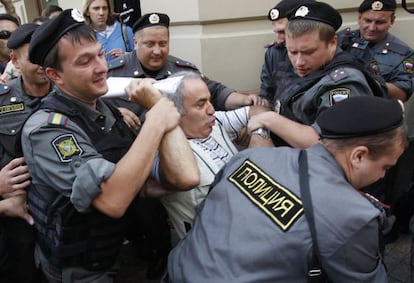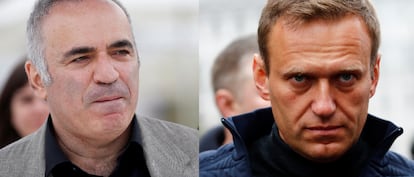Putin’s thorny foe: Chess Grandmaster Garry Kasparov
Russia places the former world chess champion on its list of terrorists and extremists, more than 10 years after moving to New York when targeted by the Russian president for his political dissension

I’m worried about the safety of a significant person in my life — Russian chess Grandmaster Garry Kasparov. AFP, the French international news agency, recently reported that Kasparov has been included on the Russian government’s list of “terrorists and extremists.” Although not surprising (read on for my reasons), it concerns me because President Vladimir Putin doesn’t believe in Danish chess theorist Aron Nimzowitsch’s principle: “A threat is stronger than the execution.” Putin espouses exactly the opposite, which puts all of his critics at risk.
Kasparov has been relentlessly moving his bishop against Putin’s king for a long time, even before retiring from top competition in 2005. He now spends much of his time opposing Putin, whom he has long accused of aiming to “checkmate Russian democracy.” If you want to know more, read Kasparov’s book Winter is Coming (2015), published shortly after Putin annexed Crimea. In a tremendous display of clairvoyance, it tells the story of Russia’s regression to dictatorship and the price the West will pay for allowing this. Kasparov was among the few people who early on identified the Russian leader as the grave threat to the world that is now widely acknowledged.
We all know this to be true, but some, particularly the Trump-controlled Republican Party, seemed oblivious to it when they held up aid to Ukraine. Following the invasion, Kasparov reiterated the urgent need to stop Putin at all costs, even if it meant Europe ending its energy dependence on Russia and facing the tough transition. It’s a fact that the “at all costs” scenario includes the risk of nuclear warfare. However, Kasparov points out that Putin alone cannot trigger such a catastrophic event. He must secure the approval of two key figures — Russia’s Minister of Defense and the Chief of the General Staff — who are painfully aware that it would result in the immediate devastation of most of Russia and its people.
After Russia’s invasion of Ukraine in 2022, Kasparov recalled a prophetic paragraph from his book. “War is always terrible, but Putin’s shift towards ethnic-based imperialism is alarming. Those downplaying the global impact of the war in Ukraine are missing Putin’s clear warning. His ambition for a ‘Great Russia’ won’t stop in eastern Ukraine. Dictators only stop when forced, and giving in to Putin in Ukraine will likely fuel his appetite for further conquests.” Those words were written almost 10 years ago, but are even more relevant today.
I remember a trip I made to Moscow in 2005 to interview Kasparov. Two things surprised me. From previous trips to the USSR and Russia, I observed that many Western Russians show racism and xenophobia. I questioned the political influence someone like Kasparov, born in Azerbaijan to an Armenian mother and a Jewish father, could have. Kasparov was a recently retired sports hero who received more attention for his achievements than his background. He was respectfully received during visits to polling stations and meetings with opposition figures. Despite Kasparov’s popularity, his biggest political obstacle was the staunch opposition of Russia’s government-controlled media.
The other surprise was seeing how convinced Kasparov was that his life was at serious risk after two minor attacks at political events. I spent almost three days with him, always surrounded by a team of bodyguards working in shifts around the clock, and we traveled in an armored car. That’s why I asked him if he had ever read Don Quixote, as he was risking his life despite having the option to live peacefully in Russia or abroad.
Understanding Kasparov’s character often leads back to his mother, Clara Shagenovna, a remarkably resilient woman. In an interview from December 1985, shortly after her son became the youngest world champion, she told me, “Being number one is very hard, very challenging. Living simply for the joy of it is beyond our comprehension.”

Around 2012, six years after our three days together in Moscow, Kasparov learned extremist groups close to Putin were targeting three of his most popular opponents: Boris Nemtsov, Alexei Navalny and himself. In 2013, he made the tough choice to move to New York, leaving his mother behind in Moscow. When she passed away in December 2020 during the pandemic, he didn’t attend the funeral out of fear, knowing what happened to Nemtsov (assassinated in 2015) and Navalny (poisoned in 2020).
He moved to New York and also maintained a home in Croatia for a European passport. He continues to be very active as a writer, columnist, lecturer, president of the Human Rights Foundation, and occasional chess player. Kasparov is a prolific tweeter on political subjects and is often interviewed by major American media outlets.
Navalny died in a Siberian prison on February 16 while his fellow dissident, labeled a “foreign agent” by the Kremlin since 2022 and now as a “terrorist and extremist,” slept in New York. When he awoke, he immediately labeled the death a murder.
Putin tried and failed to murder Navalny quickly and secretly with poison, and now he has murdered him slowly and publicly in prison. He was killed for exposing Putin and his mafia as the crooks and thieves they are. My thoughts are with the brave man's wife and children.
— Garry Kasparov (@Kasparov63) February 16, 2024
I want to believe Kasparov will know how to protect himself better this time. In 2014, I spent six days with him on a private plane lent by American patron Rex Sinquefield. He was campaigning against Putin’s man, Kirsan Ilyumzhinov, to become president of the International Chess Federation (FIDE). Before every takeoff and after every landing, he made sure to call his mother. He believed he would win, even though he knew all about the corruption among FIDE’s voting members. Kasparov lost 110-61.
But I am cautiously optimistic that he will take every precaution because of something that happened two years ago. A Spanish documentary producer proposed a chess meeting in Seville between Kasparov and his once fierce rival Anatoly Karpov (now a member of the Russian Parliament with Putin’s party, although he opposed the invasion of Ukraine). The two would relive the 1987 World Chess Championship that Kasparov won by a slim margin in Seville’s Lope de Vega theater. The money was good and his memories of Seville were fond, but Kasparov flatly turned it down. It’s pretty easy to figure out why.
Sign up for our weekly newsletter to get more English-language news coverage from EL PAÍS USA Edition
Tu suscripción se está usando en otro dispositivo
¿Quieres añadir otro usuario a tu suscripción?
Si continúas leyendo en este dispositivo, no se podrá leer en el otro.
FlechaTu suscripción se está usando en otro dispositivo y solo puedes acceder a EL PAÍS desde un dispositivo a la vez.
Si quieres compartir tu cuenta, cambia tu suscripción a la modalidad Premium, así podrás añadir otro usuario. Cada uno accederá con su propia cuenta de email, lo que os permitirá personalizar vuestra experiencia en EL PAÍS.
¿Tienes una suscripción de empresa? Accede aquí para contratar más cuentas.
En el caso de no saber quién está usando tu cuenta, te recomendamos cambiar tu contraseña aquí.
Si decides continuar compartiendo tu cuenta, este mensaje se mostrará en tu dispositivo y en el de la otra persona que está usando tu cuenta de forma indefinida, afectando a tu experiencia de lectura. Puedes consultar aquí los términos y condiciones de la suscripción digital.









































